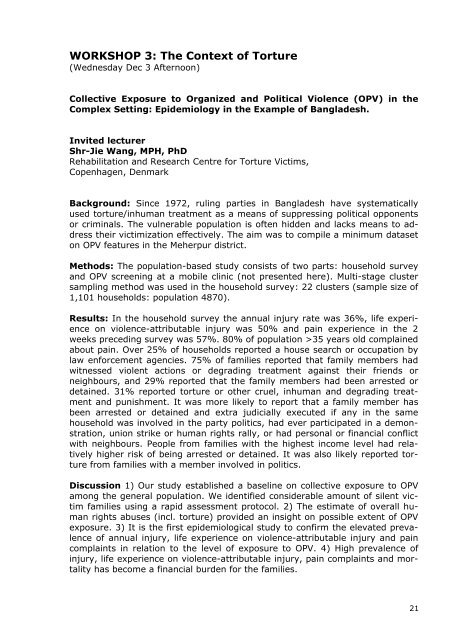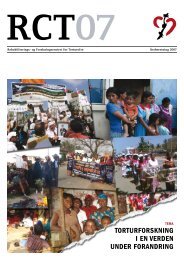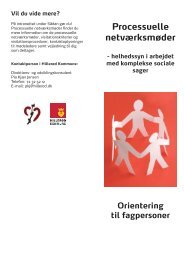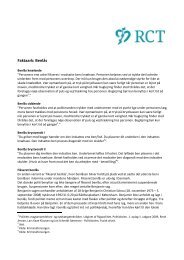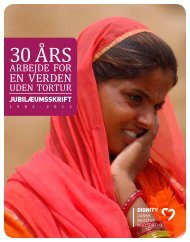Rehabilitating Torture Survivors - Dignity - Danish Institute Against ...
Rehabilitating Torture Survivors - Dignity - Danish Institute Against ...
Rehabilitating Torture Survivors - Dignity - Danish Institute Against ...
Create successful ePaper yourself
Turn your PDF publications into a flip-book with our unique Google optimized e-Paper software.
WORKSHOP 3: The Context of <strong>Torture</strong>(Wednesday Dec 3 Afternoon)Collective Exposure to Organized and Political Violence (OPV) in theComplex Setting: Epidemiology in the Example of Bangladesh.Invited lecturerShr-Jie Wang, MPH, PhDRehabilitation and Research Centre for <strong>Torture</strong> Victims,Copenhagen, DenmarkBackground: Since 1972, ruling parties in Bangladesh have systematicallyused torture/inhuman treatment as a means of suppressing political opponentsor criminals. The vulnerable population is often hidden and lacks means to addresstheir victimization effectively. The aim was to compile a minimum dataseton OPV features in the Meherpur district.Methods: The population-based study consists of two parts: household surveyand OPV screening at a mobile clinic (not presented here). Multi-stage clustersampling method was used in the household survey: 22 clusters (sample size of1,101 households: population 4870).Results: In the household survey the annual injury rate was 36%, life experienceon violence-attributable injury was 50% and pain experience in the 2weeks preceding survey was 57%. 80% of population >35 years old complainedabout pain. Over 25% of households reported a house search or occupation bylaw enforcement agencies. 75% of families reported that family members hadwitnessed violent actions or degrading treatment against their friends orneighbours, and 29% reported that the family members had been arrested ordetained. 31% reported torture or other cruel, inhuman and degrading treatmentand punishment. It was more likely to report that a family member hasbeen arrested or detained and extra judicially executed if any in the samehousehold was involved in the party politics, had ever participated in a demonstration,union strike or human rights rally, or had personal or financial conflictwith neighbours. People from families with the highest income level had relativelyhigher risk of being arrested or detained. It was also likely reported torturefrom families with a member involved in politics.Discussion 1) Our study established a baseline on collective exposure to OPVamong the general population. We identified considerable amount of silent victimfamilies using a rapid assessment protocol. 2) The estimate of overall humanrights abuses (incl. torture) provided an insight on possible extent of OPVexposure. 3) It is the first epidemiological study to confirm the elevated prevalenceof annual injury, life experience on violence-attributable injury and paincomplaints in relation to the level of exposure to OPV. 4) High prevalence ofinjury, life experience on violence-attributable injury, pain complaints and mortalityhas become a financial burden for the families.21


